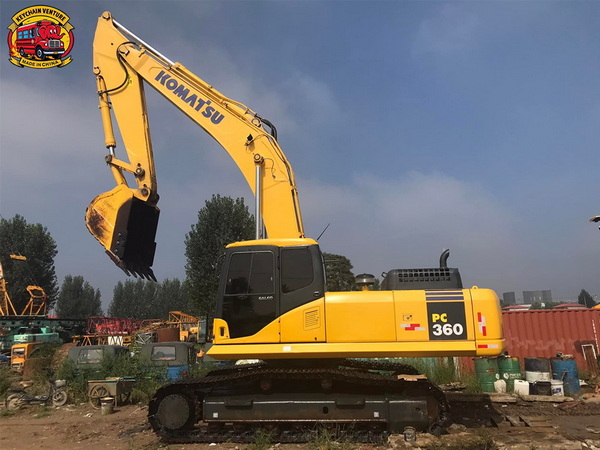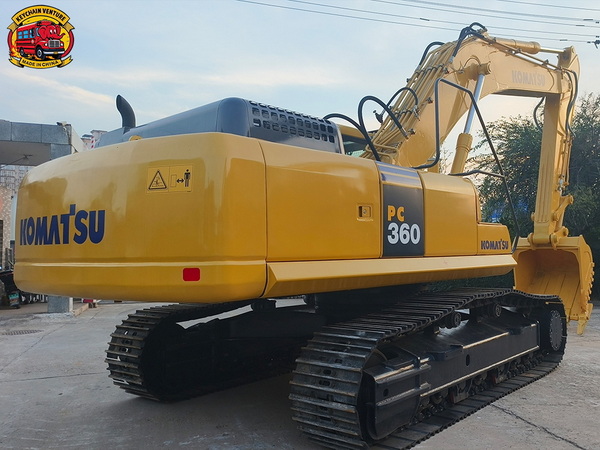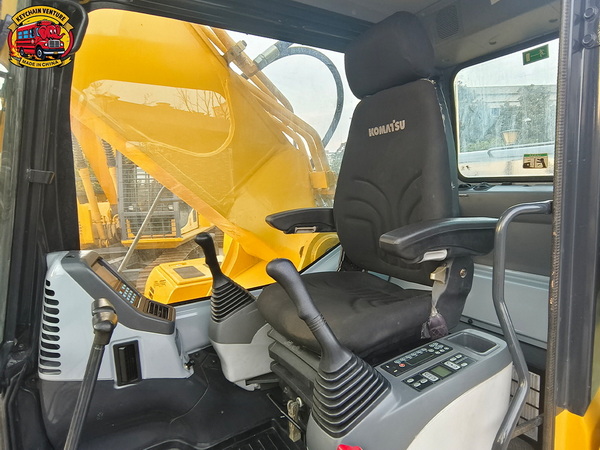







Content Menu
● Introduction to Used Excavators
>> Cost Savings
● How to Determine Your Excavator Needs
● Where to Find Quality Used Excavators
● Essential Inspection Checklist
>> 4. Tracks and Undercarriage
● Understanding Excavator Specifications
● Financing and Budgeting Tips
● Warranty and Service Considerations
● Transporting Your Used Excavator
● Common Issues in Used Excavators
● Maintenance Tips After Purchase
● FAQ
>> 1. What should I prioritize when inspecting a used excavator?
>> 2. How many operating hours are acceptable for a used excavator?
>> 3. Can I finance a used excavator purchase?
>> 4. Are warranties available for used excavators?
>> 5. How can I ensure I am buying from a trustworthy seller?
Buying a used excavator can be a smart and cost-effective investment for businesses and individuals involved in construction, landscaping, or other heavy-duty projects. However, purchasing a used excavator requires careful consideration to ensure you get a machine that fits your needs, performs reliably, and lasts for years. This comprehensive guide will walk you through everything you need to know about how to buy a used excavator, including key factors to examine, tips on inspections, red flags to avoid, and much more.

Used excavators are heavy construction machines that have been previously owned and operated but remain effective and functional for various earth-moving tasks. These machines perform digging, demolition, lifting, and grading with impressive power and precision. Buying used excavators is popular because it allows you to acquire reliable equipment at a fraction of the cost of new models.
Excavators come in many sizes and configurations, from compact models ideal for tight urban sites to large machines built for major infrastructure projects. Knowing the history and current condition of a used excavator is critical to ensuring a good purchase.
One of the most significant benefits of buying a used excavator is the considerable cost savings. New excavators depreciate rapidly once sold, so used machines can offer excellent value while maintaining performance.
Used machinery can often be obtained faster than waiting for new production and delivery, allowing you to start projects sooner.
The used market offers numerous choices across brands, sizes, and attachments, making it easier to find a machine tailored to your specific task requirements.
Older machines that have been well-maintained often prove reliable and durable in operation, especially if comprehensive service records are available.
Understanding the types of excavators available will help narrow your search:
- Mini Excavators: Compact, versatile units ideal for smaller scale jobs, landscaping, or urban construction.
- Standard Excavators: Medium-sized machines suited for general construction, excavation, and utility projects.
- Large Excavators: Heavy-duty equipment used in mining, large earthworks, and major infrastructure.
- Crawler Excavators: Equipped with tracked platforms providing excellent stability on rough terrain.
- Wheeled Excavators: Feature rubber tires, offering greater mobility on paved or firm surfaces.
Before diving into the buying process, assess your project requirements carefully:
- Project Scale and Type: Consider excavation depth, terrain type, and workload.
- Weight and Size Restrictions: Look at transport routes and site access limitations.
- Attachments and Versatility: Decide if you need buckets, breakers, grapples, or other tools.
- Operating Environment: Is it urban, rural, muddy, rocky, or a demolition site?
Understanding these factors helps you select the appropriate used excavator model and configuration, ensuring efficient and safe operations.
Here are some of the best sources to find quality used excavators:
- Authorized Dealerships: Offer machines with service history, warranties, and support.
- Online Marketplaces: Platforms specialized in heavy equipment sales provide extensive listings.
- Auction Sites: Allow competitive bidding but require careful evaluation.
- Rental Companies Selling Fleet Machines: Regularly maintained and inspected equipment.
- Direct Sellers: Private owners or construction companies upgrading fleets.
When sourcing from auctions or private sellers, exercise caution and insist on detailed machine histories and inspection reports.
Conducting a thorough inspection is one of the most critical steps when buying a used excavator. Here's a detailed checklist:
- Check for cracks, dents, or weld repairs on the boom, arm, and bucket.
- Inspect paint wear patterns which might indicate overuse or poor maintenance.
- Look for oil leaks or hydraulic fluid dripping, especially around connections.
- Test hydraulic cylinders for smooth operation with no jerks or hesitations.
- Examine hoses and seals for wear, cracks, or visible signs of leaks.
- Pay attention to unusual noises during operation that could signal hydraulic pump issues.
- Check engine oil and coolant levels, ensuring they are clean and at proper levels.
- Listen for unusual engine noises during idle and working speeds—knocks, ticks, or chugging sounds can be red flags.
- Inspect the radiator and cooling fan for damage and proper function.
- Measure track wear, pin condition, and sprockets to estimate remaining lifespan.
- Look at rollers, idlers, and track tension; improper tension can cause accelerated wear.
- Check for bent or broken components in the undercarriage that could indicate poor maintenance.
- Ensure all controls respond smoothly and precisely, including boom, arm, and bucket functions.
- Test the swing function for smooth movement with no grinding or resistance.
- Operate the machine's travel functions on tracks or wheels, checking for smoothness and absence of unusual vibrations or noises.
- Verify the condition of the operator's cabin, including seat comfort, visibility, and safety features.
- Test instrumentation and control panels for full functionality.
- Check the air conditioning and heating systems if applicable, as comfort affects productivity.
- Request maintenance logs and repair histories.
- Consistent, documented service is a strong indicator of machine care.
- Look for records on oil changes, part replacements, and any major repairs.
Hiring a qualified technician for a professional inspection is highly recommended to uncover hidden issues.

Key specifications you should understand include:
- Operating Weight: The total weight impacts transport and site access.
- Engine Power (HP): Determines digging strength and efficiency.
- Bucket Capacity: Affects the amount of material moved per cycle.
- Digging Depth and Reach: Critical for your tasks, especially when working in trenches or deep foundations.
- Swing Speed and Radius: Influences the efficiency of material repositioning on site.
- Fuel Efficiency: Operational cost factor that can have a significant impact over machine life.
Matching these specs against your project requirements ensures you select a machine that optimizes productivity without over-investing.
Buying a used excavator requires budgeting not just for the purchase price but also for:
- Inspection and necessary repairs or upgrades.
- Transportation costs to your work site.
- Licensing, registration, and appropriate insurance coverage.
- Routine maintenance, parts replacement, and fuel costs.
Explore financing options such as equipment loans, leasing agreements, or vendor financing to ease cash flow strains. Many financial institutions offer specialized programs for used heavy equipment, often with competitive interest rates.
Proactively factor in spare parts availability and costs for the model you choose to avoid financial surprises.
When negotiating the purchase of a used excavator, consider:
- Using your inspection findings as leverage to justify a lower price.
- Factor in the machine's age, hours of operation, and comparable market prices.
- Request inclusion of attachments or spare parts, which can add significant value.
- Clarify warranty coverage, if any, and ask about options for additional service plans.
- Discuss payment schedules, deposits, and any penalties for delayed payment or cancellation.
A fair and transparent negotiation benefits both parties and often results in a smoother transaction.
Used excavators generally come with limited or no factory warranty; however:
- Some dealers include short-term warranties or service agreements to give buyers peace of mind.
- Private sellers typically sell “as-is” without guarantees.
- Verify any transferable warranties still active on major components like engines or hydraulic systems.
Post-purchase, establishing a service routine based on manufacturer recommendations will help in maintaining warranty conditions and extending equipment life.
Transport requires special planning:
- Select appropriate trailers or flatbeds rated for your excavator's weight and dimensions.
- Arrange for any necessary permits for oversize or overweight loads, depending on route and local regulations.
- Consider professional heavy equipment transport services for reliability and safety.
- Make sure you have transit insurance coverage to protect against damage during shipment.
Proper transport safeguards your investment and helps to avoid costly delays.
Some common wear problems and mechanical issues encountered in used excavators include:
- Hydraulic Leaks and Hose Failure: Aging hoses or worn seals frequently cause fluid leaks that reduce efficiency and may damage components.
- Engine Wear: High operating hours or poor maintenance can lead to decreased power, excessive smoke, or overheating.
- Undercarriage Wear: Tracks, rollers, and sprockets wear out faster under abrasive or uneven surfaces.
- Electrical Issues: Sensor failures, wiring shorts, or nonresponsive control panels can affect machine performance.
- Structural Damage: Weld cracks or stress fractures in the boom or arm could reduce safety and operational ability.
Remember to factor repair costs or part replacements when evaluating used excavators.
To maintain your used excavator in top condition:
- Follow the manufacturer's recommended maintenance schedule diligently.
- Regularly check fluid levels—engine oil, hydraulic fluid, coolant—and replace filters as needed.
- Perform daily inspections of wear parts such as track links, buckets, and pins.
- Keep a detailed log of all maintenance and repairs to aid future resale value and troubleshooting.
- Store the machine properly when not in use to protect it from environmental damage.
Regular preventive care reduces downtime and costly repairs.
Buying a used excavator is an excellent way to acquire powerful, reliable construction equipment while managing your budget effectively. By investing time in understanding your needs, evaluating potential machines carefully, performing thorough inspections, and negotiating wisely, you can secure a high-performance used excavator that meets your project demands. Don't underestimate the importance of maintenance and after-purchase care to maximize the lifespan and productivity of your investment. Whether you are a contractor, construction company, or individual operator, following these guidelines will help you make an informed and confident purchase.

When inspecting, prioritize the hydraulic system condition, engine health, undercarriage wear, smooth operation of controls, and verify absence of leaks or structural damage. Also, review maintenance records.
Generally, a used excavator with less than 5,000 hours is considered in better condition, though lower hours don't always guarantee better performance. The key is consistent maintenance and service history.
Yes. There are many financing options, including loans and leasing programs designed specifically for used heavy equipment purchases offered by banks and equipment dealers.
Warranties on used excavators vary. Some dealers offer limited warranties or service contracts; factory warranties usually do not transfer. Confirm warranty terms and coverage before buying.
To ensure credibility, buy from authorized dealers, reputable platforms with buyer protections, or sellers who provide full service histories and allow inspections. Avoid deals that appear too good to be true.